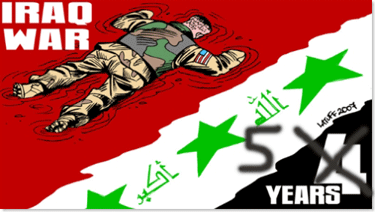
by Victor Navasky & Christopher Cerf
The Nation, March 17, 2008 (web only)
Who said the Iraq War would pay for itself? Why, the experts did.
To mark the fifth anniversary of America’s Iraq debacle, The Nation offers daily words of wisdom from those who led us there, courtesy of a new book by Christopher Cerf and Victor Navasky, Mission Accomplished! Or, How We Won the War in Iraq: The Experts Speak (Simon & Schuster).
Here’s our thought for today:
Things are better and there are encouraging signs. I have been here many years–many times over the years. Never have I been able to drive from the airport, never have I been able to go out into the city as I was today. The American people are not getting the full picture of what’s happening here.
Senator John McCain
at a news conference in the Green Zone
after completing a “walking tour” of the Shorja market
April 1, 2007.
More pearls of wisdom from Navasky and Cerf:
More people get killed in New York every night than get killed in Baghdad. The fact of life is that there will never be such a thing as one hundred percent security–it doesn’t exist.
L. Paul Bremer III
Director of the Coalition Provisional Authority
August 2003.
“Iraq is a very wealthy country. Enormous oil reserves. They can finance, largely finance the reconstruction of their own country. And I have no doubt that they will.”
Richard Perle, chair
The Pentagon’s Defense Policy Board
July 11, 2002
“The likely economic effects [of a war in Iraq] would be relatively small…. Under every plausible scenario, the negative effect will be quite small relative to the economic benefits.”
Lawrence Lindsey
White House economic adviser
September 16, 2002
“It is unimaginable that the United States would have to contribute hundreds of billions of dollars and highly unlikely that we would have to contribute even tens of billions of dollars.”
Kenneth Pollack
former director for Persian Gulf affairs
National Security Council
September 2002
“The costs of any intervention would be very small.”
Glenn Hubbard
White House economic adviser
October 4, 2002
“Iraq has tremendous resources that belong to the Iraqi people. And so there are a variety of means that Iraq has to be able to shoulder much of the burden for their own reconstruction.”
Ari Fleischer
White House press secretary
February 18, 2003
“When it comes to reconstruction, before we turn to the American taxpayer, we will turn first to the resources of the Iraqi government and the international community.”
Donald Rumsfeld
Secretary of Defense
March 27, 2003
“There is a lot of money to pay for this that doesn’t have to be US taxpayer money, and it starts with the assets of the Iraqi people. We are talking about a country that can really finance its own reconstruction and relatively soon.”
Paul Wolfowitz
Deputy Secretary of Defense
testifying before the defense subcommittee
of the House Appropriations Committee
March 27, 2003
“The United States is very committed to helping Iraq recover from the conflict, but Iraq will not require sustained aid.”
Mitchell Daniels, director
White House Office of Management and Budget
April 21, 2003
“The allies [have contributed] $14 billion in direct aid.”
Dick Cheney
vice presidential debate with
Democratic candidate John Edwards
October 5, 2004
Actually, only $13 billion was pledged, and on the date Cheney spoke only $1 billion had arrived. As of October 28, 2007, the National Priorities Project estimated that the share of Iraq War costs that had been borne by American taxpayers exceeded $463 billion. –C.C.&V.N.